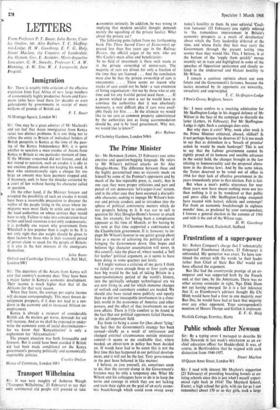The Prime Minister
Sir: Mr Hensman (Letters, 23 February) uses some emotive and question-begging language. He refers to Mr Wilson's political attacks on Sir Alec Douglas-Home. The difference between these and the highly personalised ones so viciously made on himself by some of the Premier's opponents and by much of the less reputable press, is, surely, that in one case they were proper criticisms and part and parcel of our democratic 'let's-argue-it-out' system, and in the other case they have assumed a discredit- able character, seeking to impugn Mr Wilson's hon- our and private conduct, and to introduce into the sphere of political ,controversy matters which do not properly belong to it. It was not to call in question Sir Alec Douglas-Home's honour to attack him, for example, for having been a conspicuous appeaser at the time of Munich, or for having by his vote at that time supported a continuance of the Chamberlain government. It is, however, to int- pugn Mr Wilson's honour to use gutter gossip about him as a means of achieving the political aim of bringing the Government down. One hopes and believes tIlat character assassination will never, in this country, take the place of, where needed, a 'hell for leather' political argument, as it seems to have been doing in some quarters just lately.
If I might venture a criticism of my party I think we failed to stress enough three or four yeats ago how big would be the task of taking Britain in a near-revolutionary period of the world's history, into the spiritually unhappy technological era we are now living in, and for which immense changes of outlook and customary conduct are needed. We should also have stated more publicly and openly than we did our inescapable involvement in a close- knit world in the economies of America and other powers, and the effect of that involvement on our own affairs. There is 1;;tle comfort to be found in the fact that our political opponents failed likewise, in this all-important field.
Far from its being a cause for jibes about 'lying,' the fact that the Government's strategy has been revised—chiefly as a result of unforeseen and changed external circumstances outside ministers' control—it seems to me creditable that, where needed, an about-turn in policy has been decided on. If words have had to be eaten this is not the first time this has happened in our political develop- ment, and it will not be the last. Tory governments in the past have behaved in like manner.
I believe, as you yourself, sir, sometimes seem to do, that the current slump in the Government's fortunes maybe only a temporary one. What Mr Wilson and his colleagues have to do is to keep the nerve and courage in which they are not lacking and train their sights on the goal of an early econo- mic breakthrough which could soon sweep away today's hostility to them. In your editorial 'Coali- tion fantasies' (23 February) you rightly referred to 'the tremendous improvement in Britain's economic prospects as a result of devaluation' about which the Tory leadership dithered at the time, and whose fruits they fear may carry the Government through the present testing time sooner than they would like. This, I believe, is at the bottom of the 'topple them quickly' moves recently set in train and highlighted in some of the speeches of Opposition spokesmen and closely re- lated to the undeserved and blatant hostility to Mr Wilson.
I remain a cautious optimist about our own future and the Government's fortunes, because the tactics mounted by its opponents are unworthy, unrealistic and unprincipled.


































 Previous page
Previous page